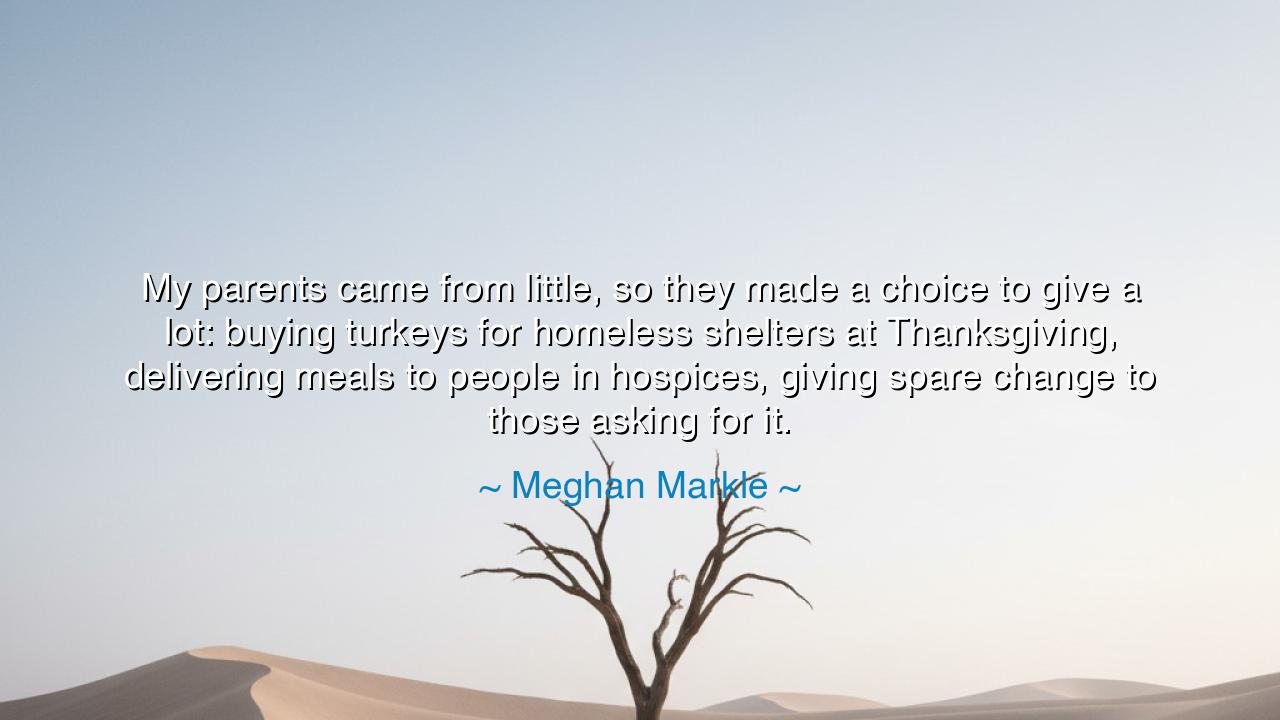
My parents came from little, so they made a choice to give a
My parents came from little, so they made a choice to give a lot: buying turkeys for homeless shelters at Thanksgiving, delivering meals to people in hospices, giving spare change to those asking for it.






Meghan Markle, speaking with reverence for her roots, declared: “My parents came from little, so they made a choice to give a lot: buying turkeys for homeless shelters at Thanksgiving, delivering meals to people in hospices, giving spare change to those asking for it.” In these words, she reveals a truth as old as time: that generosity is not the fruit of abundance, but the fruit of the heart. Her parents, though lacking in worldly riches, chose to cultivate compassion and service, teaching her through example that the true wealth of life is measured not in what one hoards, but in what one gives.
The origin of this saying lies in the lived reality of those who rise from humble beginnings. To be born with little is often to know the pain of want, the longing for dignity, the fragility of survival. Yet from such beginnings can arise the greatest virtues, for those who have felt hunger understand the value of bread, and those who have felt loneliness understand the gift of presence. Markle’s parents, though poor in possessions, were rich in the spirit of charity, and by their actions, they gave their daughter a legacy more enduring than gold.
History gives us countless testimonies of this same truth. Consider the story of St. Francis of Assisi, who abandoned his wealth to embrace poverty, yet in doing so, gave the world an inheritance of humility, compassion, and service that still inspires centuries later. Or look to Mother Teresa, who had little in her own hands, yet gave tirelessly to the dying and forgotten of Calcutta, teaching that greatness lies not in possessing much, but in loving much. These lives echo the wisdom Markle honors in her parents: that small acts of kindness, multiplied daily, carry eternal weight.
The Thanksgiving turkey, the meal delivered to a hospice, the coin placed in a stranger’s hand—these are not grand gestures in the eyes of the world, but they are holy in their simplicity. They are the quiet flames that keep the darkness at bay. In such actions, the giver says to the receiver: “You are not forgotten. You are worthy. You are part of us.” This is the deepest essence of community—that we do not live only for ourselves, but for one another.
The deeper meaning of Markle’s reflection also lies in the teaching by example. Her parents did not merely instruct her with words, but with deeds. Children learn not by command alone, but by watching what their elders live out before them. A sermon on generosity is easily forgotten, but the sight of a parent placing food into the hands of the hungry is written forever in the child’s heart. Thus, the memory of her parents’ giving became a moral compass, shaping how she sees the world and her responsibility within it.
The lesson for all who hear is this: do not wait for abundance before you give. Generosity is not born of excess, but of willingness. Even the smallest act—offering food, visiting the sick, sparing a coin—can carry immeasurable weight in the life of another. And in giving, you not only bless the receiver, but also sow seeds in the hearts of your children and those who witness your deeds, creating ripples that will reach far beyond your own lifetime.
Practical wisdom flows from this truth: cultivate habits of giving in your own household. At the table of Thanksgiving, share not only with your family but also with strangers in need. When walking past one who asks for help, pause, and remember that dignity is often restored not by the size of the gift, but by the act of seeing and responding. Teach your children to join you in these acts, for they will remember them long after words are forgotten. In this way, you build not only a family tradition, but a heritage of compassion.
Thus, Meghan Markle’s reflection becomes more than a personal memory—it becomes a teaching for the ages. The greatness of her parents lay not in what they owned, but in what they chose to give. Let this truth be passed down to future generations: that true wealth is measured not by accumulation, but by generosity; not by possessions, but by love in action. And let us each, no matter how small our means, become rich in the only treasure that endures—the treasure of giving.






AAdministratorAdministrator
Welcome, honored guests. Please leave a comment, we will respond soon